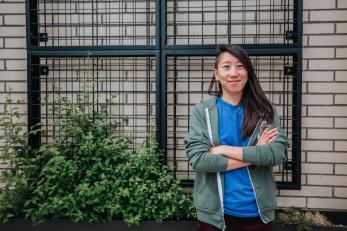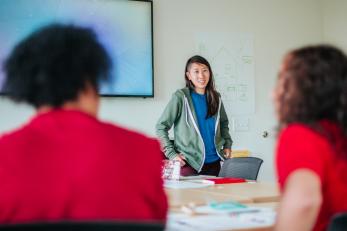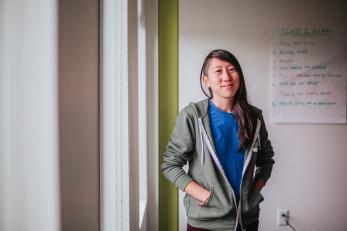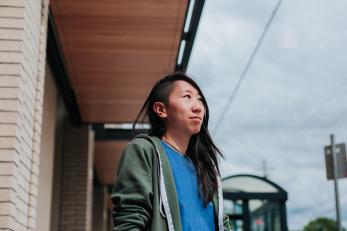VISTA stories: Centering the voices Oregonians with disabilities

A place to call home
At a Tenant Education class at Community Vision, people with developmental disabilities are learning how to navigate Portland’s tricky housing market. Yvonne Chung, an AmeriCorps VISTA and Affordable Housing Associate, explains the balancing act between what one wants and what one can afford.
As a VISTA at Community Vision, Chung has been leading the curriculum adaptation and pilot implementation of the RentWell class for people with disabilities. RentWell, a tenant rights curriculum created by Transition Projects, centers the impact of living next to a gracious neighbor, and outlines strategies for building good credit when the time comes to fill out a rental application.

Chung, a Portland native, says she has always been passionate about community service. She considered working for the Peace Corps, but was enticed to learn that she could serve her local community. She worked in a program that dealt more with direct service, and recently chose working with Mercy Corps Northwest as a VISTA to gain experience in indirect, capacity building services for a local nonprofit. She wanted to make a difference at the grassroots level and strengthen her community. Housing is an important issue in Portland and her current position at Community Vision allows her to pour herself into this issue.
Chung started the Housing Access Program at Community Vision. To help connect people with homes they can afford, she is building a referral system between support services brokerages and individuals with disabilities to determine where they are in their “journey of housing.” Once each person’s housing situation is identified, Yvonne has designed the program to then connect individuals to resources that may be helpful, including classes and recommended strategies.

The power of shared progress
Connecting with people and expanding the reach of housing resources is important to Chung. She says she decided to work with Community Vision because she was attracted to their core belief that people of all abilities deserve a place of their choosing, in their communities where they can live, work and thrive. Chung explains, “With the history of disability services in Oregon, people were limited to living in institutions and big facilities where they were isolated.
A lot of issues resolve themselves when you integrate people into the communities where they want to live instead of limiting them to certain facilities. This philosophy really aligned with my belief that everyone has something to bring to the table, everyone has strengths to offer, and you just have to find ways to foster this and bring it out.”

Economic visualization
In Community Vision’s RentWell class, students use M&Ms to create a simple economy to visualize how they might have to compromise. One participant said a private bathroom is very important, and used three candies, while a washer and dryer on site is of no importance and therefore only used one candy.
The object of the game is to budget and think about how compromise may be useful, and to not run out of candy. Facilitators of the class remind the students that “life happens” too, and the exercise explores how budgets can be affected with a little good, or bad luck. For example, a speeding ticket or adopting a pet can shift or derail a financial plan.

Resilience is key to success
When asked what stands out to her about her role at Community Vision, Chung responds, “Honestly, the resilience of people. I hear so many stories about what people have to go through, and I admire so much their ability to keep going and to keep fighting and to take steps to help themselves and find resources that get them where they need to get. There are a lot of times, if I was in that situation, I don’t even know what I would do, how long I could keep going, but people find a way.”
As an example of the barriers people face in the housing market Chung recalls a story about a client who had previously been accepted into an apartment where the rent amounted to the total sum of their income. When they finally got settled in, there was no money left over for living expenses. “They never should have been accepted into that apartment in the first place, but they were, and now they are being evicted. Sometimes people sign things, or agree to things not knowing what the consequences are, or they are just taken advantage of.”
Low income is also a huge barrier to finding affordable housing. For many, employment is not an option, so they live on disability benefits or supplemental security income that is $771 a month. According to a recent article in The Oregonian, a fair-market rate for a one-bedroom apartment in Portland is $1,132 a month. Trying to find housing with half that, is a challenge. Alternatives for people with disabilities include getting roommates, group homes, adult foster homes but these all come with their own set of challenges. The staff that works at such places are often not trained to provide adequate care.

Support for navigating the system
Some of the solutions Chung’s program is trying to implement include talking with housing developers to get more subsidized units on the market, but it’s a slow process. Otherwise, a key to lending help is providing good information. Staff members at Community Vision are well connected and have been serving the people with disabilities for a long time.
“People are looking for some direction and they need someone to tell them what to and where to go because it is really hard to navigate the system.” Chung adds, “A lot of services exist that people don’t know about. Hopefully by telling them about it, and giving them solid concrete information that people can follow up on will help with some of the barriers.”
Learn more about Mercy Corps Northwest’s AmeriCorps VISTA program here. Explore more about Community Vision on their website.